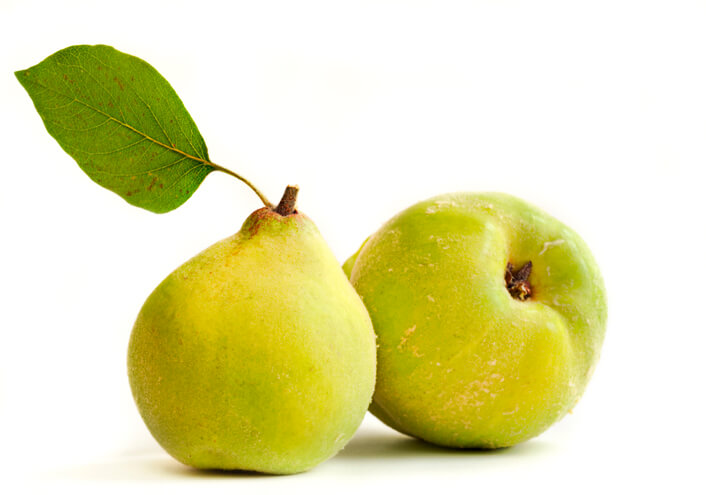The Forbidden Fruit May Have Been a Quince! Here’s What You Should Know.
6 years ago | Nutrition
By Joy Stephenson-Laws, JD, Founder
Apparently, when Eve convinced Adam to eat the forbidden fruit, it may not have been an apple.
Some sources say that the quince fruit actually predates the apple, and that “...all the ancient mentions like the forbidden fruit in the Garden of Eden were indeed referring to the quince.” Some say it is one of the earliest known fruits.
The quince fruit belongs to the Rosaceae plant family, along with apples, almonds, cherries, pears, raspberries and strawberries. Reportedly, it is native to Caucasus, Transcaucasia and Central Asia.
To be honest, quinces are not the best when consumed raw.
“They are too hard, too tart, too acidic, too sour, and too generally unpleasant in taste and texture to eat raw,” according to one source.
But the good news is…
“Sufficient cooking, however, softens them and brings out the floral aroma they hold deep inside along with a lovely sweetness that balances out their sour edge.”
Quince is often used to make jams and marmalades, and you can also poach or bake it.
And whether quince was the forbidden fruit or not, here’s why it perhaps should not be a forbidden fruit for you!
Quince fruit may provide relief from nausea and vomiting that is associated with pregnancy (NVP).
NVP affects between 50 to 80 percent of pregnant women, and some cases can be very severe. Feeling nauseous, of course, is never pleasant, and vomiting may cause dehydration and loss of nutrients. Not ideal for a pregnant lady!
A recent study, published by the National Institutes of Health (NIH), reported administering quince syrup to pregnant women who were suffering from NVP.
“In early pregnancy, the use of chemical drugs is avoided, so there is an increasing tendency to use alternative therapies.”
And the quince syrup appeared to provide some relief, making it an alternative therapy.
(As always, consult a competent healthcare professional about any new food or treatment during your pregnancy).
Quince may provide protection against cancer.
This fruit is rich in polyphenols, natural plant chemicals that may provide anti-cancer benefits. One study suggested that Japanese quince exhibited anti-metastatic activities towards colon cancer cells.
Quince may help lower cholesterol.
One study suggests that quince leaf extract taken in combination with Atorvastatin (a statin) may lower cholesterol.
Furthermore, the” leaf extract can be a substitute for statins in treatment and prevention of cardiovascular disease. The anti-atherosclerotic effect of quince leaf is most likely related to its antioxidant components.”
Quince may help regulate blood pressure.
Quince is very rich in the mineral potassium. Just one quince fruit contains about 181 mg of potassium.
This must-have mineral works with sodium to balance the fluids and electrolytes in the body. Potassium helps keep blood pressure under control and may even help reduce kidney stones and bone loss as you age.
Quince may help with certain skin issues.
A study suggested that topically applying an ethanol extract of quince seeds helped provide relief from atopic dermatitis, a chronic inflammatory skin disease that can cause your skin to become red and itchy.
(Seek the advice of a dermatologist or competent healthcare professional before attempting to treat any skin conditions with quince extract).
Quince is also just a very nutrient-dense fruit, rich in essential vitamins and minerals we all need to stay healthy and keep our bodies functioning properly such as vitamin C, vitamin A, fiber, copper, selenium, zinc and more.
Precautions with quince?
Do not consume the seeds, as these contain cyanide and are poisonous!
There are also a lot of quince supplements out there. It is imperative that you consult your doctor before taking a quince supplement (or any supplement for that matter). Also ask about quince essential oil if this is something you are interested in.
As always, it is best to seek medical advice about any of the foods, supplements and alternative therapies you have in your proactive healthcare arsenal. This is especially important for those with existing medical conditions, people taking medication and women who are pregnant or breastfeeding.
Enjoy your healthy life!
The pH professional health care team includes recognized experts from a variety of health care and related disciplines, including physicians, attorneys, nutritionists, nurses and certified fitness instructors. This team also includes the members of the pH Medical Advisory Board, which constantly monitors all pH programs, products and services. To learn more about the pH Medical Advisory Board, click here.







